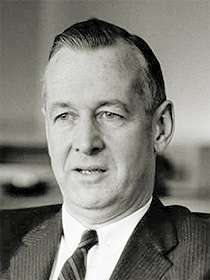James Alfred Perkins
| James Alfred Perkins | |
|---|---|
 | |
| President of Cornell University | |
|
In office 1963–1969 | |
| Preceded by | Deane Waldo Malott |
| Succeeded by | Dale R. Corson |
| Personal details | |
| Born |
October 11, 1911 Philadelphia, Pennsylvania |
| Died |
August 19, 1998 (aged 86) Burlington, Vermont |
James Alfred Perkins (October 11, 1911 – August 19, 1998[1]) was the seventh president of Cornell University, from 1963 to 1969.
Perkins was born in 1911 in Philadelphia, graduated with honors in 1934 from Swarthmore College, and received a doctorate in political science from Princeton University in 1937.[1][2] At Swarthmore, Perkins joined the Delta Upsilon Fraternity and played varsity football alongside his classmate, DU brother and future 1972 Nobel Prize laureate Christian B. Anfinsen. From 1937 to 1941 he was a faculty member at Princeton. After service in the Office of Price Administration and the Foreign Economic Administration during World War II, he was vice president of Swarthmore from 1945 to 1950.[1]
In 1950 he joined the Carnegie Corporation, an educational foundation. In 1951–1952, on leave from there, he served as deputy chairman of the Research and Development Board of the Department of Defense. In addition while at Carnegie he chaired President Kennedy's Advisory Panel on a National Academy of Foreign Affairs, sat on the General Advisory Committee of the Arms Control and Disarmament Agency, the U.S. Committee for UNESCO, and the Board of Trustees of the RAND Corporation, and headed the Rockefeller Brothers Fund committee that produced the report, The Power of the Democratic Idea.[1]
Perkins served as president of Cornell from October 4, 1963, until his resignation on May 31, 1969 in the wake of the occupation of Willard Straight Hall by armed African American students. In 1995 Thomas W. Jones, a trustee of the university who had been a leader of the building occupation, established the James A. Perkins Prize for Interracial Understanding and Harmony in his name.[1][2][3]
He was a member of the Carnegie Commission on Higher Education from 1967 to 1973,[2] and after leaving Cornell, founded the International Council for Educational Development in Princeton, New Jersey. In 1978 he was appointed chairman of President Carter's Commission on Foreign Language and International Studies.[2] He was a member of the Steering Committee of the Bilderberg Group.[4]
Perkins' publications include The University in Transition (1966),[2] a series of three lectures in which he argued that a university must balance its three missions of research, teaching, and public service.[5][6] He died in Burlington, Vermont, of complications after a fall while in the Adirondacks.[1]
Notes
- 1 2 3 4 5 6 Linda Grace-Kobas (August 27, 1998). "James A. Perkins, president emeritus, dies at 86". Cornell Chronicle. Archived from the original on May 9, 2003.
- 1 2 3 4 5 William H. Honan (August 22, 1998). "James A. Perkins, 86, Adviser On Higher Education Policy". The New York Times.
- ↑ "Perkins Prize". Office of the Dean of Students, Cornell University. Retrieved May 14, 2017.
- ↑ "Former Steering Committee Members". bilderbergmeetings.org. Bilderberg Group. Archived from the original on February 2, 2014. Retrieved February 8, 2014.
- ↑ A. C. F. Beales (February 1967). "Review: The University in Transition by James A. Perkins". British Journal of Educational Studies. 15 (1): 94. doi:10.2307/3119593. JSTOR 3119593.
- ↑ H. C. Dent (March 1967). "Review: The University in Transition by James A. Perkins". Comparative Education. 3 (2): 133. JSTOR 3098371.
External links
- Cornell Presidency: James A. Perkins
- Cornell University Library Presidents Exhibition: James Alfred Perkins (Presidency; Inauguration)
Further reading
- Donald Alexander Downs (1999). Cornell '69: Liberalism and the Crisis of the American University. Ithaca, New York: Cornell University. ISBN 9780801436536.
| Academic offices | ||
|---|---|---|
| Preceded by Deane Waldo Malott |
President of Cornell University 1963–1969 |
Succeeded by Dale R. Corson |